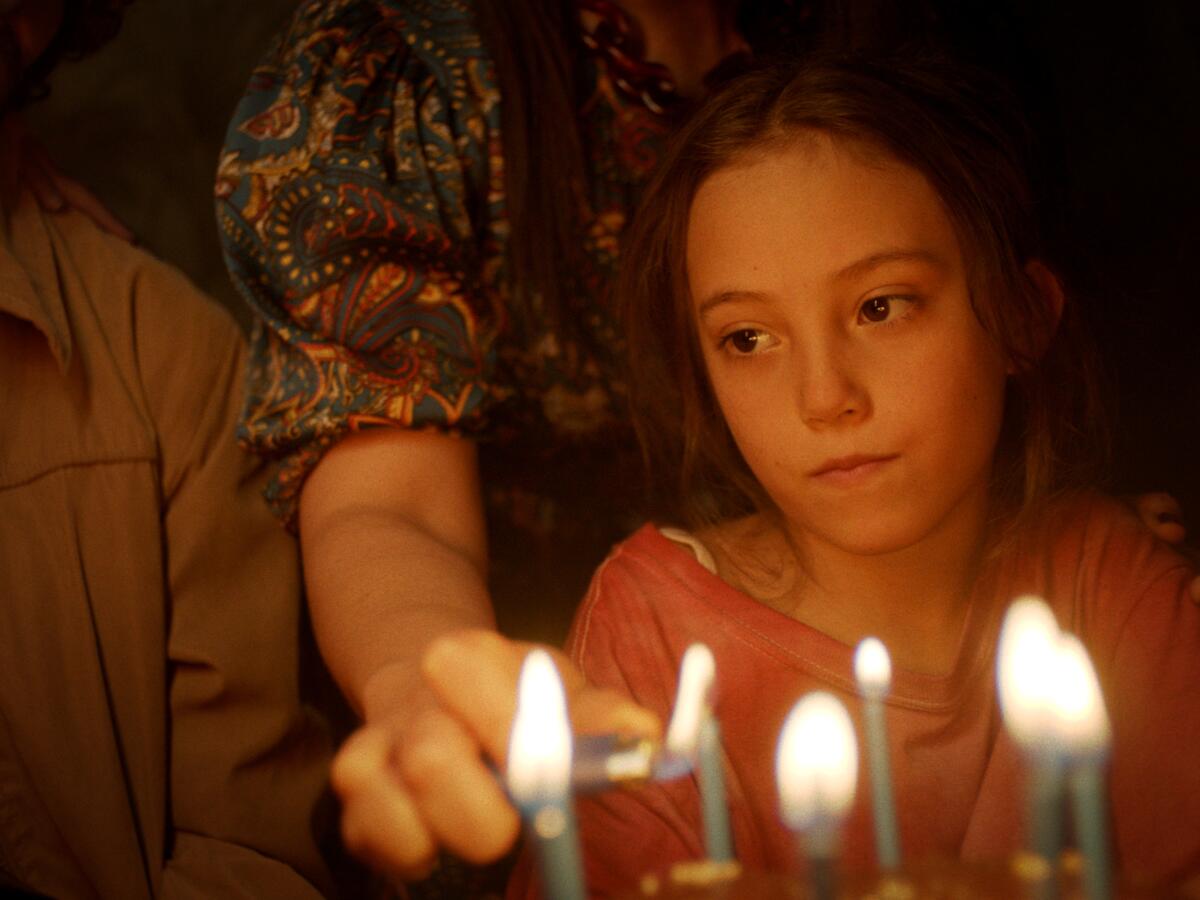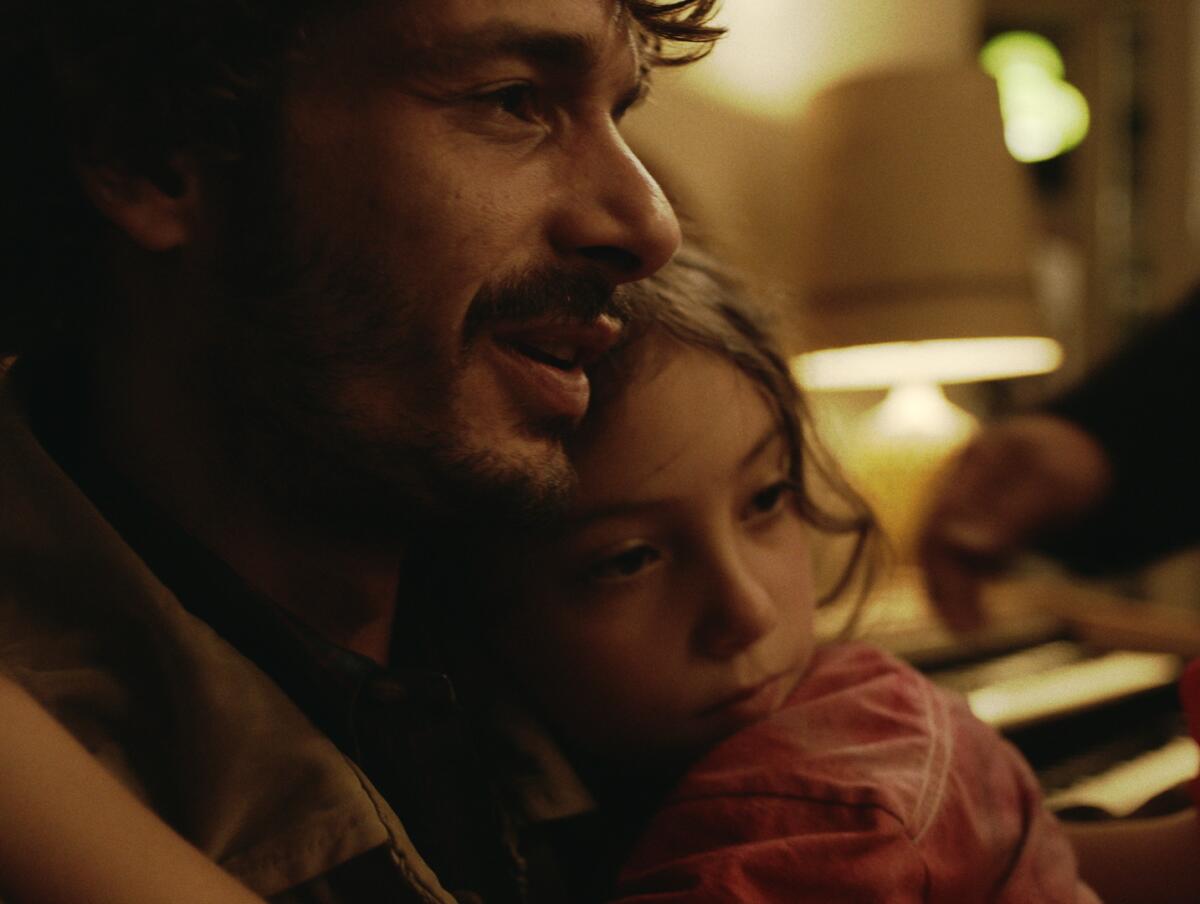‘Tótem,’ a haunting drama about a family at a turning point, will stay with you forever

- Share via
One of the first and last things you see in “Tótem,” Lila Avilés’ lovely and astonishing second feature, is a shot of a young girl’s face. It’s a beautiful face, with gentle eyes, a radiant if infrequent smile and a quiet wisdom well beyond its years. When you meet the 7-year-old Sol (Naíma Sentíes), she’s giggling with her mother, Lucia (Iazua Larios), in a public restroom, trying on a rainbow-hued clown wig that she’ll wear at a party later that evening. When you see her for the final time, the delight has faded from her expression, and all that remains is a kind of wistful desolation, a desire to cling fast to a childhood that she knows is about to change forever.
In between these two shots, a long day and an entire world come vibrantly into focus. For much of the movie, which runs a compact but overflowing 95 minutes, we are in a large, crowded house somewhere in Mexico City, where preparations for the party are underway. The guest of honor is Sol’s terminally ill father, Tona (Mateo García Elizondo), observing what will likely be his final birthday. He’s been too sick to see his daughter recently, and even after she arrives at the house, dropped off by her mother, she’s kept away from him for as long as possible. And so, left to her own devices, Sol wanders from room to bustling room, a shy, watchful presence set adrift in a churning sea of grown-ups.
The roving handheld camera, wielded by the cinematographer Diego Tonorio, follows after her, bearing witness to all manner of family fractiousness along the way. Avilés’ technique has grown looser, more mobile and rough-hewn than in her 2018 debut feature, “The Chambermaid,” a meticulously composed portrait of a worker in a luxury hotel. But the achievement of “Tótem,” Mexico’s official (but sadly unnominated) submission in this year’s Oscar race for international feature, is not all that different from that of its predecessor: to capture the spirit of a place.
As if to underscore that notion, the movie soon ushers in a visiting medium who might help reverse Tona’s terrible decline. Avilés, directing the movie from her own screenplay, finds an effortless human comedy in this woman’s noisy arrival, following her as she weaponizes water buckets and even a piece of bread in her quest to cleanse the house of its dark, demonic influences. There’s humor, too, in the curmudgeonly gripes of Sol’s grandfather (“I’m not in the mood for your satanic bulls—,” he growls into his electronic larynx) and also in the stress of Sol’s aunt Nuri (Montserrat Marañon) as she looks after her own young daughter, nurses several drinks and rushes to bake a birthday cake for the party.

When that cake finally emerges hours later, after a smoky kitchen disaster, we see that it’s been decorated with an imprint of Van Gogh’s “Starry Night” — a passing but revealing detail (Tona is a painter) in a movie that refuses to linger. Avilés keeps her camera insistently on the prowl, as if she were eager to keep tabs on everyone in the house (the number keeps growing) at every moment. Her powers of observation miss nothing: roughhousing children, bickering adults, pets scampering underfoot. Amid the tumult, there are brief, blissfully peaceful shots of ants skittering up and down a wall, and also of a snail slithering across Sol’s open palm. Beneath this one roof, all creation seems to converge.
The eye with which Avilés surveys this unwieldy human and animal circus is at once strikingly unsentimental and sweepingly egalitarian. Those bugs and slugs will soon expire, and so will the fast-fading Tona. Portraits of terminal illness are nothing new in the movies, but if this one registers with particular force, it’s precisely because Avilés’ filmmaking, terse and relentless, refuses to slow down for Tona. As he wastes away in his bed, making his occasional long, agonizing trips to the bathroom with the help of his attentive nurse, Cruz (Teresita Sánchez), we can already sense life moving on without him.
The moment when Sol is finally permitted to see her father is fleeting, piercing and suffused with the most helpless kind of love. There’s clearly more to the story here; we long to see Sol’s happier days with him, and perhaps to learn more about her parents’ relationship, which appears to have ended some time before. There’s also more to learn about the tensions bubbling up between Nuri and another aunt, the friends who toast Tona at his party and the financial burdens that at one point turn the gathering into a fundraiser. It takes a confident storyteller to avoid the trap of overexplanation, to give us only a partial glimpse of her characters’ lives, and these narrative elisions have the effect of deepening rather than undercutting the story’s realism.
Which is not to say that “Tótem,” its title rich with spiritual portent, is entirely tethered to the real. This is a movie about a celebration astride the abyss, and, as it continues, it takes on the eerie power of a séance. By a certain point we seem to have wandered, alongside Sol, into a strange netherworld between life and death. It’s as if we have become the ghost in the machine, the specter looming behind the camera, and we want, against all reason, to comfort her, to let her know that she is neither unseen nor alone. The sensation soon passes, as many sensations do. But you can’t quite shake it off, or rid yourself of this movie’s cumulatively shattering power.
'Tótem'
Not rated
In Spanish with English subtitles
Running time: 1 hour, 35 minutes
Playing: Starts Friday at Laemmle Glendale and Laemmle Monica Film Center, West Los Angeles
More to Read
Only good movies
Get the Indie Focus newsletter, Mark Olsen's weekly guide to the world of cinema.
You may occasionally receive promotional content from the Los Angeles Times.









